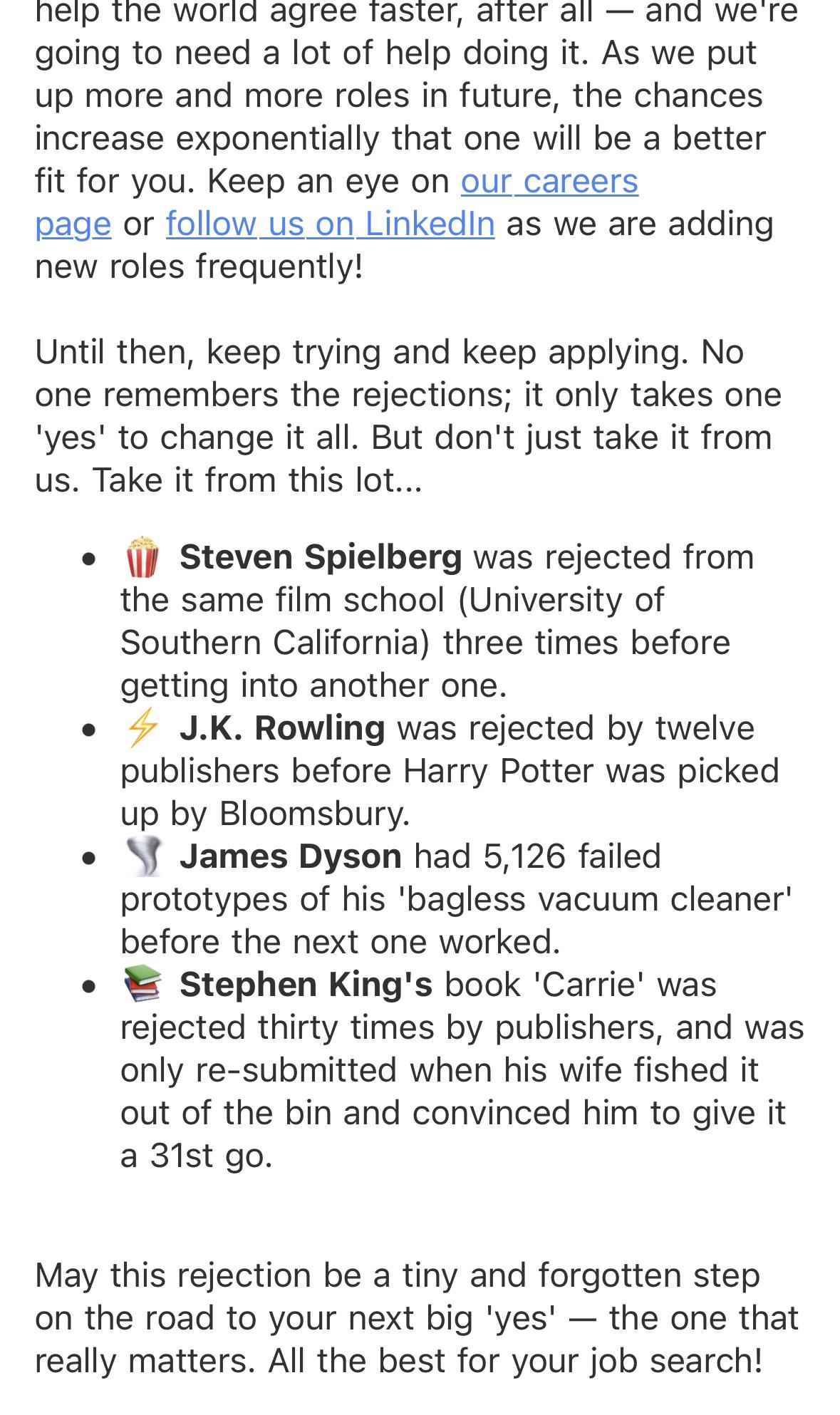Submitted by beardedPirate963 t3_102irse in GetMotivated
Comments
Wolfs_Rain t1_j2tj42h wrote
I remember the Stephen King story. I wonder what the people who rejected them thought after they became hits?
I remember Tom Cruise was told he’d never be a lead actor because he was to short. You really do have to keep it pushing.
No_Education153 t1_j2trxsy wrote
All things are possible when you cleanse your Orgones.
[deleted] t1_j2wj7kh wrote
I so needed this !!! As a writer, this is everything!!! Thank you for sharing this !!!
EuclidsIdentity t1_j2wtkw7 wrote
In 2019 I got rejected over 1000 times before I got my first job in August of that year. I know because I kept a spreadsheet of all my applications. In 3 1/2 years I’ve gone from being dependent on the charity of others to losing ~$500k in a year and still be comfortable.
mrexplosive0 t1_j2tqe2d wrote
J.K. Rowling was rejected? Good.

thepunalwaysrises t1_j2ubgst wrote
My initial reaction was being torn. But after thinking about it, I'm going to have to say using blanket rejection letters as a blanket policy suck. Here's why:
TL;DR: Tiny NYC publishing house lets college intern write bespoke rejection letters to unsolicited submissions by aspiring authors, some of who wrote back to say thanks.
Longer version: As a college intern in the mid-90s, I worked at a tiny publishing house of around 5 "full time" paid employees. One of my first jobs was reviewing the "slush pile," a literal pile of unsolicited submissions by people unrepresented by literary agents yet who, as far as I could tell, did little to no research before submitting their draft of the "best vampire novel" ever. (This was the mid- to late-90s. Anne Rice was still the shit, if her shit was the thing you were in to.)
The publishing house had a boilerplate rejection letter that basically said "thanks but no thanks" in polite enough ways. I used it frequently.
But once in a while, a submission caught my eye. Not because I thought it was good or even submitted to the right place, but because it left me thinking that the person on the other end was talented or, for whatever reason, deserved something other than a boilerplate rejection letter.
So, I would write back to that person directly. I would say, in so many words, (1) here's the genres this house publishes vs. what you submitted (so they knew what went wrong), (2) encourage them to find an agent if they were serious vs. blindly submit things, esp. without doing their homework first, and (3) noting whatever it was that caught my eye with their submission and offering genuine words of encouragement. Maybe they were capable of putting words together. Maybe it was the plot line. I dunno. But I would suggest that they find something new or original to write about, rather than trying to write the next vampire novel.
Most did not respond. Maybe it was the oodles of money they made on the next NYT best seller, maybe they moved and didn't change their address. Or maybe they had a rejection letter slush pile of their own. I dunno. But those who did write back were forever grateful to both be acknowledged and to have someone finally say, "Here's why this doesn't work."
Obviously, responding on an individual level is not always logistically or legally possible (or pragmatic). As much as I appreciate the pull of a "It's not you, it's us" rejection letter that also drops famous names, and bearing in mind that what I'm about to say may be unpopular, I think that offering encouragement in what appears to be a boilerplate rejection letter is a bad idea, esp. if you're telling the candidate to continue following your business on LinkedIn. (You rejected them but still want the follows?) If you're going to use a rejection letter to offer someone encouragement as if they were asking you out on a date, do it sparingly and judiciously, not simply because you're employer is too chickenshit to just say, "No thanks" or "Go pound sand."
YMMV.